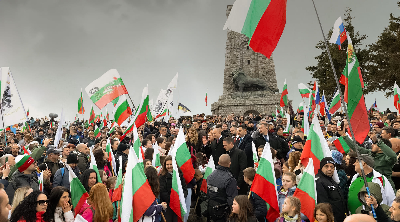
©
Тисячі болгар вийшли на вулиці столиці та інших великих міст країни з вимогою зупинити процес переходу на євро та провести загальнонаціональний референдум щодо заміни національної валюти — лева. Мітингарі несли плакати з гаслами «Свободу болгарському леву» та «Майбутнє — за суверенними державами». У Софії учасники акції розгорнули великий транспарант із написом: «Битва за болгарський лев — остання битва за Болгарію. Протест став реакцією на очікуване найближчими днями рішення Єврокомісії надати Болгарії дозвіл на вступ до єврозони. Попри членство в Європейському Союзі з 2007 року, Болгарія залишається однією з найбідніших країн блоку. Багаторічна політична нестабільність та корупція підірвали довіру громадян до влади, що створює сприятливий ґрунт для євроскептицизму. Багато болгар побоюються, що введення євро призведе до зростання цін та падіння купівельної спроможності, що вже спостерігалося в інших країнах після переходу на нову валюту. Дослідження Євробарометра підтверджують: значна частина молоді в Болгарії вважає, що неодноразово стикалася з дезінформацією. На тлі слабкої довіри до офіційних джерел та впливу проросійських наративів, побоювання щодо євро активно підігріваються кампаніями в соціальних мережах. Це призводить до того, що євро часто сприймається не як економічна інтеграція, а як загроза національному суверенітету. Президент Румен Радев, відомий своїм критичним ставленням до прозахідного курсу уряду, виступив з ініціативою проведення референдуму щодо переходу на євро. Цей крок розкритикувала більшість у парламенті, яка підтримує європейську інтеграцію, звинувативши главу держави в потуранні інтересам Москви. Вони вбачають у закликах до референдуму спробу зірвати процес приєднання до єврозони, що має зміцнити геополітичну стабільність країни в умовах зростаючої напруги в Європі.
Battle for the Lev: Why Bulgaria Rose Up Against the Euro
Thousands of Bulgarians have taken to the streets of the capital, Sofia, and other major cities, demanding a halt to the process of adopting the euro and calling for a nationwide referendum on replacing the national currency — the lev. Protesters carried placards with slogans such as “Freedom for the Bulgarian lev” and “The future belongs to sovereign states.” In Sofia, demonstrators unfurled a large banner reading: “The battle for the Bulgarian lev is the last battle for Bulgaria.”The protest erupted in response to the European Commission’s expected decision — due within days — to greenlight Bulgaria’s entry into the eurozone. Despite being a member of the European Union since 2007, Bulgaria remains one of its poorest countries. Years of political instability and widespread corruption have eroded public trust in the government, creating fertile ground for growing euroscepticism. Many Bulgarians fear that switching to the euro will lead to a spike in prices and a decline in purchasing power, as seen in other countries following currency transitions. Eurobarometer surveys confirm that a significant portion of Bulgarian youth believe they have repeatedly encountered disinformation. Amid low trust in official sources and the influence of pro-Russian narratives, concerns about the euro are actively stoked by social media campaigns. As a result, the euro is often perceived not as a tool of economic integration, but as a threat to national sovereignty. President Rumen Radev, known for his critical stance toward the government’s pro-Western course, proposed holding a referendum on euro adoption. This move was sharply criticized by the pro-European majority in parliament, which accused the president of catering to Moscow’s interests. Lawmakers view the call for a referendum as a last-minute attempt to derail Bulgaria’s accession to the eurozone — a step seen as vital for strengthening the country’s geopolitical stability amid rising tensions across Europe.
2156